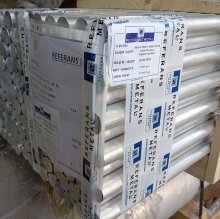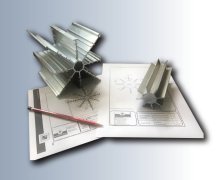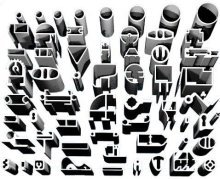



Platten
Blech
Rundstangen
Rohre/ Extrusion/ Profil
2024
AMS 4037 / AlCu4Mg1 / 2024 / T351
| Chemical Properties | % Value |
| Silicon (Si) | 0,00 - 0,50 |
| Chromium (Cr) | 0,00 - 0,10 |
| Manganese (Mn) | 0,30 - 0,90 |
| Magnesium (Mg) | 1,20 - 1,80 |
| Copper (Cu) | 3,80 - 4,90 |
| Titanium (Ti) | 0,00 - 0,20 |
| Iron (Fe) | 0,00 - 0,50 |
| Zinc (Zn) | 0,00 - 0,25 |
| Aluminium (Al) | Balance |
| Physical Properties | Value |
| Density | 2.78 g/cm³ |
| Melting Point | 502 °C |
| Thermal Expansion | 23 µm/m-K |
| Modulus of Elasticity | 73.1 GPa |
| Thermal Conductivity | 121 W/m.K |
| Electrical Resistivity | 30% IACS |
| Mechanical Properties | Value |
| Proof Strength | 330 MPa |
| Yield Strength | 460 MPa |
| Shear Strength | 290 MPa |
| Elongation A50 mm | 13% |
| Hardness | 120 HB |
The 2024 T351 aluminum alloy is known for its high strength and durability. As part of the aluminum-copper alloy class, it is primarily used in structural components and applications requiring high strength. The cold-worked T351 temper enhances the alloy's durability. Its light weight, high strength-to-weight ratio, and good machinability make it widely used in industries such as automotive, aerospace, and space.
The 2024 T351 alloy has limited suitability for anodizing. Due to its high copper content, anodizing does not form a strong oxide layer on the surface. Therefore, alternative protective coatings are preferred to protect the material. In terms of weldability, the 2024 T351 alloy requires careful attention during welding due to its high copper content. Proper techniques and filler materials can minimize the risk of cracking, but a careful welding process is necessary.
In terms of bending and forming, the 2024 T351 aluminum alloy shows moderate machinability. Due to its high strength, bending operations can present challenges, but with the right processing techniques, successful bending and forming can be achieved. Additionally, the alloy is suitable for use in high-vibration environments. Its high durability and elastic modulus make it ideal for applications such as engine parts and chassis.
Regarding corrosion resistance, the 2024 T351 aluminum alloy shows lower resistance compared to other aluminum alloys due to its high copper content. This can limit its use in marine and humid environments. However, corrosion resistance can be enhanced with appropriate coatings and surface treatments. The advantages of the 2024 T351 aluminum alloy include high strength, good machinability, and light weight, while its disadvantages include limited anodizing compatibility, lower corrosion resistance, and welding challenges.
ALLOY DESIGNATIONS
Aluminum alloy 2024 T351 has similarities to the following standard designations and specifications:
As Cold drawn round bar and Hexagonal bars: 2024 T351, AMS 4120, AMS QQ-A-225/6, ASTM B211
As Plate and Sheet: 2024 T351, AMS QQ-A-250/4, AMS 4037, EN 2419, WS 3.1394, AIR 9048-120, ASTM B209
As Alclad Plate and Sheet: 2024 T351, AMS QQ-A-250/5, AMS 4041, AIR 9048-140, EN 4001, ASTM B209
As Cold Drawn Flat Bars: 2024 T351, ASTM B211
Choosing Factors for 2024 T351
- Strength: High
- Machining: Good
- Weldability: Mid (Spot welding is the best choice)
- Formability: Poor
- Corrosion Resistance: Poor
- Heat Treating: Yes
Some Well-Known Applications for 2024 T351
Hydraulic manifolds in aircrafts,
Horizontal tail fittings,
Vertical tail ribs and spars.
SUPPLIED FORMS
2024 T351 aluminum alloy is supplied in plate, sheet, bar/round bar, tube/extrusion.
- Plate
- Sheet
- Round Bar / Bar
- Tube / Extrusion
| Mechanical Properties | |||
| Thickness (mm) | Proof Strength (Min.) | Yield Strength (Min.) | Elongation A50 mm % |
| Up to & incl. 6.25mm | 290 MPa | 393 MPa | %12 |
| Over 6.3mm up to & incl. 19mm | 303 MPa | 414 MPa | %12 |
| Over 19mm up to & incl. 38mm | 317 MPa | 448 MPa | %10 |
| Over 38mm | 358 MPa | 483 MPa | %10 |

 Gewichts-Kalkulator
Gewichts-Kalkulator

